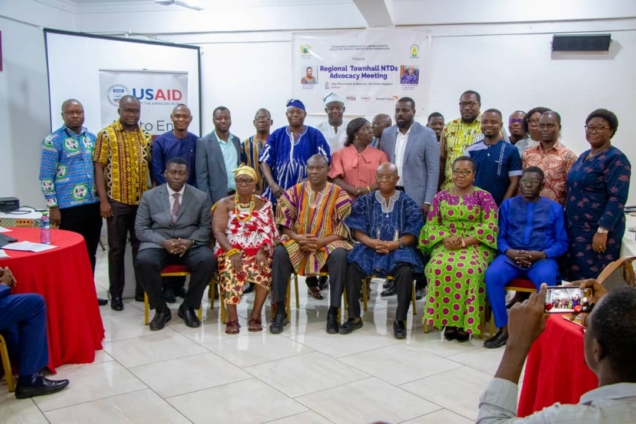The Volta Regional Health Directorate, in collaboration with the Secretariat of Neglected Tropical Diseases (NTDs), has held a town hall advocacy event in the Volta Regional capital of Ho.
The initiative was aimed at increasing awareness, educating the public, and fostering community engagement in the fight against these often-overlooked health challenges.
Neglected tropical diseases are a group of infectious diseases that primarily affect populations in tropical and subtropical regions. They are predominant in marginalized and underserved communities.
These diseases, which include but are not limited to, river blindness, schistosomiasis, and lymphatic filariasis - can have severe health consequences if left untreated.
The Volta Regional Director of the Ghana Health Service, Dr Chrysantus Kubio, indicated that Ghana is committed to eliminating NTDs by 2030, with the introduction and implementation of several policies.
He emphasized the importance of active community participation and vigilance in preventing and controlling the spread of NTDs.
"Neglected Tropical Diseases pose a significant threat to the well-being of our communities. By joining forces with the NTDs Ambassador, we aim to empower individuals with knowledge and resources to protect themselves and their families," said Dr. Kubio.
He also urged stakeholders to focus on the three strategic shifts outlined in the Global NTDs Road Map: thus, “prioritizing impact over process, ensuring heightened accountability and holistic health solutions.
Secondly, integrating within national health systems and adopting comprehensive interventions and last but not the least, bolstering national and sub-national ownership to enhance the viability and sustainability of NTD initiatives.”
The NTDs Ambassador, Rev. Dr. Joyce Aryee, highlighted global efforts to eliminate these diseases and the crucial role communities have to play in achieving this goal.
"Neglected Tropical Diseases affect millions of people worldwide, often trapping them in a cycle of poverty. Through education and community-driven initiatives, we can break this cycle and create healthier, more resilient societies," Rev. Dr. Joyce Aryee said.
She lamented that persons affected by NTDs are unable to contribute effectively to local productivity.
The Volta Regional Minister, Dr. Archibald Yao Letsa applauded the extraordinary strides made against neglected tropical diseases (NTDs) in Ghana and more specifically the Volta Region.
He said that “these conditions have significantly declined over the period up to this point where the fruits of our hard labor point to the fact that the eradication of NTDs is indeed within our grasp.”
The event featured interactive sessions, and educational presentations by healthcare professionals, while informational materials were distributed to empower attendees with knowledge about preventive measures and available treatments.
Latest Stories
-
Dr. Ayensu-Danquah defends professorship, stating 15 years of teaching surgery
2 hours -
Access Bank honoured with two prestigious awards at 2025 HESS Awards
2 hours -
A/R: Aspiring nurse killed in Denase gun attack
2 hours -
Oti Region to get university within my tenure – Mahama reaffirms pledge
2 hours -
Daughter killed in father’s arson attack over sex denial
4 hours -
NPA Scandal: Four suspects remain in custody after failing to meet bail conditions
5 hours -
NPP to open 2028 flagbearer nominations on July 29
5 hours -
Sam George to open Pan-African AI Summit 2025
6 hours -
NDC opens nominations for Akwatia parliamentary primaries on July 28
6 hours -
Guinness Ghana DJ Awards opened new doors for my career – DJ Pho
7 hours -
Mohammed Sukparu commits to advancing Ghana’s Artificial Intelligence agenda
7 hours -
‘What is coding?’ – Question raises eyebrows during Deputy Communication Minister-nominee’s hearing
7 hours -
WAFCON 2024: Ghana’s Black Queens claim third-place after penalty win over South Africa
8 hours -
Ghana celebrates 100-year-old WWII veteran Joseph Ashitey Hammond
8 hours -
Measures announced in Mid-Year Budget Review fully in line with programme objectives – IMF
8 hours

